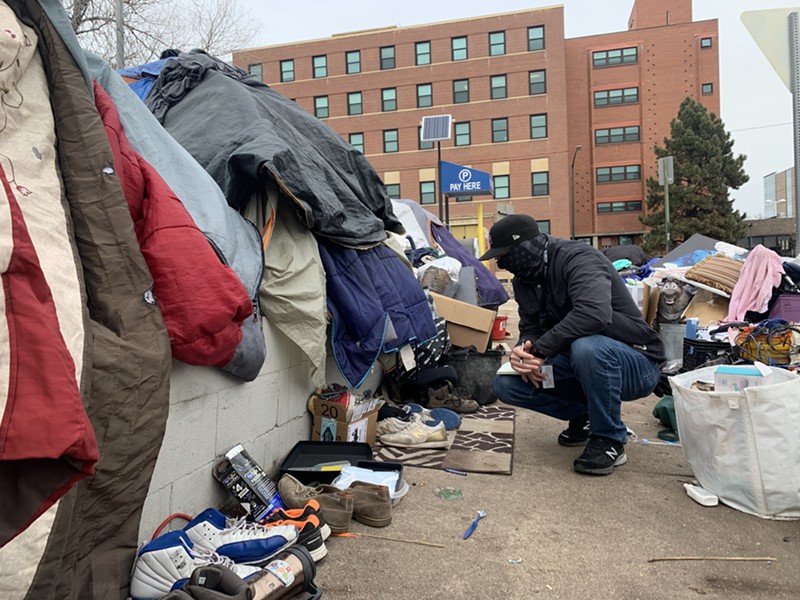Seeking to remove law enforcement officers from non-criminal matters, in March the City of Denver began to reroute all calls related to homeless encampments through 311, a telephone hotline set up in 2006 to handle non-emergency concerns of Denver residents.
The city had been getting about thirty calls a day related to homeless encampments, many of which were fielded by the Denver Police Department; officials thought the switch to 311 would be more efficient. But it didn't go smoothly.
"We saw about 100 or so [calls] a day during that time period," Laura Dunwoody, director of city services at 311, recalled at a November 15 Denver City Council Budget and Policy Committee meeting. "The issue was we couldn’t help them. So we were adding to the frustration. We weren't part of the solution.
"It was causing my average speeds of answer to go up," she added, "not because the volume was so high, but because the length of the calls were much higher than my normal three-minute call. We had an average of eight to twelve minutes on those calls."
So in July, the City of Denver began forwarding people calling 311 with homeless complaints to pocketgov, an existing online system where residents can file complaints about everything from illegal dumping to fireworks.
As a result, pocketgov is receiving somewhere in the range of 100 to 130 complaints about homeless encampments every day, while 311 is receiving just a handful of calls related to homelessness, according to Dunwoody.
From pocketgov, all encampment complaints are sent to staff with the Early Intervention Team, an entity set up last fall to provide outreach and services to budding homeless encampments with the goal of stopping them from growing larger. The EIT was first working out of the Department of Public Safety, then moved to the Department of Public Health and Environment; it will soon land at the Department of Housing Stability.
"We wanted to step out of the way," Dunwoody said, explaining why 311 operators were removed from the process. The calls her staffers had been receiving about encampments involved "a level of excitement and enthusiasm that we were not used to seeing," she added, using a polite description of the angry calls.
In June alone, 311 received 3,500 calls related to homelessness — thanks in part to a single "individual who made 500 or so calls on one encampment that he was dealing with," according to Armando Saldate of the Department of Public Safety, who oversaw the establishment of the Early Intervention Team.
During the November 15 committee meeting, Councilwoman Kendra Black described the frustration felt by many Denver residents who complain about encampments with this: "There's this circular thing: 'It's not my responsibility, it's her responsibility.' And she'll say, 'It's not my responsibility, it's her responsibility.' And then nothing gets done, and that's when you get the really angry calls, because 500 people have called about one thing, and one year later, there it sits."
For years, the City of Denver has struggled with how to deal with homeless encampments, with advocates and service providers arguing that Mayor Michael Hancock's administration acts too harshly toward unsheltered homeless individuals, while some residents and business owners claim the city's actions aren't strong enough.
Denver is currently required by a federal court settlement and a federal court order to provide a week's notice before sweeping encampments.
While the Early Intervention Team cannot issue citations, the city is also putting together a Street Enforcement Team that will be composed of civil employees authorized to enforce laws often associated with homelessness, such as trespassing and unauthorized camping; it will be housed in the Public Safety department. That team is scheduled to begin its patrols this month.

Audio By Carbonatix
[
{
"name": "Air - MediumRectangle - Inline Content - Mobile Display Size",
"component": "12017618",
"insertPoint": "2",
"requiredCountToDisplay": "2",
"watchElement": ".fdn-content-body",
"astAdList": [
{
"adType": "rectangle",
"displayTargets": "mobile"
}
]
},{
"name": "Editor Picks",
"component": "17242653",
"insertPoint": "4",
"requiredCountToDisplay": "1",
"watchElement": ".fdn-content-body",
"astAdList": [
{
"adType": "rectangleLeft",
"displayTargets": "desktop|tablet"
},{
"adType": "rectangleRight",
"displayTargets": "desktop|tablet|mobile"
}
]
},{
"name": "Inline Links",
"component": "18838239",
"insertPoint": "8th",
"startingPoint": 8,
"requiredCountToDisplay": "7",
"maxInsertions": 25
},{
"name": "Air - MediumRectangle - Combo - Inline Content",
"component": "17261320",
"insertPoint": "8th",
"startingPoint": 8,
"requiredCountToDisplay": "7",
"maxInsertions": 25,
"watchElement": ".fdn-content-body",
"astAdList": [
{
"adType": "rectangleLeft",
"displayTargets": "desktop|tablet"
},{
"adType": "rectangleRight",
"displayTargets": "desktop|tablet|mobile"
}
]
},{
"name": "Inline Links",
"component": "18838239",
"insertPoint": "8th",
"startingPoint": 12,
"requiredCountToDisplay": "11",
"maxInsertions": 25
},{
"name": "Air - Leaderboard Tower - Combo - Inline Content",
"component": "17261321",
"insertPoint": "8th",
"startingPoint": 12,
"requiredCountToDisplay": "11",
"maxInsertions": 25,
"watchElement": ".fdn-content-body",
"astAdList": [
{
"adType": "leaderboardInlineContent",
"displayTargets": "desktop|tablet"
},{
"adType": "tower",
"displayTargets": "mobile"
}
]
}
]












